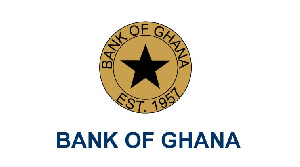Opinions of Wednesday, 31 August 2022
Columnist: Michael Ameley
BoG policy rate hike; would the anchor hold?
At the recently ended monetary Policy committee meetings, the central bank announced a raft of measures to contain the ever-rising inflation and stabilize the fast depreciating local currency. Key among them include hiking the Policy rate by 300 basis points to 22%, other measures consist of an increment in the Primary reserve of Banks from 12% to 15%.
These measures are meant to mop up excess liquidities in the system and halt rising inflation. With government revenues hugely underperforming owing to the uninspiring Performance of the much-vaunted e-levy tax handle, the government has set its attention to the domestic treasury market to borrow to shore up the country’s liquidity.
The net effect of this move is the hike in treasury bill rate to increase subscription rate and Painfully crowd out the SME and other Private sector players from having access to the much-needed funds for their business.
It still remains to be seen if investors, would respond favourably to these raft of measures, as the continuous depreciation of the cedi gives an indication of how investors failed to respond to the mid-year budget review.
From the foregoing, government is caught between a rock and a hard place, with domestic revenue under-performing, skyrocketing inflation, and a fast depreciation cedi.
Many analysts are wondering whether BoG’s anchor would hold as government appears to be dabbling in choppy waters. In an attempt to understand the situation, one needs to analyse the fundamentals of the economy, and how it has mutated up to this Point.
Ghana’s foray into the international capital market started in 2007 during Prez Kuffour’s era, when the county attained a lower middle-income status, and gained access to the international capital market. Since then, the country has borrowed to the tune of $ 15 billion from the Eurobond market.
A breakdown of the debt shows that the Kuffour’s administration opened the flood gate in 2007 with $700 million raised through the Eurobond road show, Mills and Mahama administrations combined borrowed $3.5billion dollars with the Akufo-Addo administration topping the list with a whopping $11.5billion borrowed till date.
In spite of the gains of borrowing from the international capital market as opposed to the local market, it appears that successive governments have overly relied on it in managing the local currency, instead of exploring other sustainable avenues for stabilizing the currency. So when the twin disaster of covid and the Russian/Ukraine war struck, it was only a matter of time that it exposed how weak our economic fundamentals were.
To date, opinions remain divided as to whether the twin disaster is solely responsible for our current economic woes.
Whiles government communicators insist that the twin disaster disrupted the global supply chain, with Ghana not being an exception, other analysts are fortified in their belief that the fundamentals were already weak before the advent of the twin disaster.
For now, the hope of the country is hinged on an impending I.M.F Programme which would Provide a balance of Payment support, and Policy credibility to enable the country to gain access to the international capital market.
In the interim, some receivables notably $750 million from Afrieximbank and a $1.2 billion Cocoa syndicated loan are expected to hit the treasury of the Bank of Ghana in some few months, even though not substantial enough, it's expected to hold the situation temporarily as we await the coming on stream of the I.M.F Program.
With these grim statistics from the central bank, a lot of the local banks would start adjusting their rate to reflect the hike, especially for the mortgage holder. The Banks who are obviously not father Christmas would not give you a fixed rate for a long-term facility like a Mortgage.
They would obviously give you a floating rate that would always correspond with the Prevailing inflation rate. But I need to add that it is mostly subject to the terms and conditions of one’s respective financial institutions.
This is the Projection for existing facilities, especially a mortgage, but new borrowers should please brace themselves up for an automatic hike in interest rate because the rate as announced by the central bank is only an indicative rate of how much the Banks can charge you for accessing a loan, many financial institutions would now have to do there in _house reckoning to ascertain the margins they need to add to this indicative rate to enable them to stay afloat in Business.
The rest of the year Promises to be tough for businesses especially the ones in the private sector, as government steadily implements the raft of measures announced through the BoG and Finance ministry, with the hope of changing the economic narrative.
Entertainment










